The average pair of sneakers requires hundreds of manufacturing steps, involves a lot of synthetic materials, and isn’t built to last. All of this amounts to a sustainability nightmare, with excessive carbon emissions going into sneaker assembly and the final product being used briefly before ending up in landfills. Here are our top picks for climate friendly sneakers.
Table of Contents
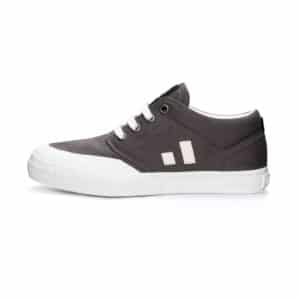
The best sustainable sneaker brand
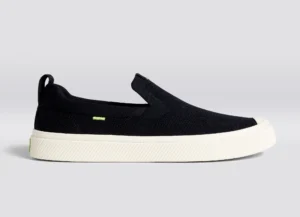
Best comfortable sustainable sneaker
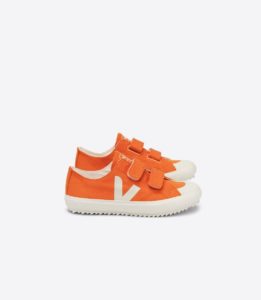
Best sustainable kid’s sneakers
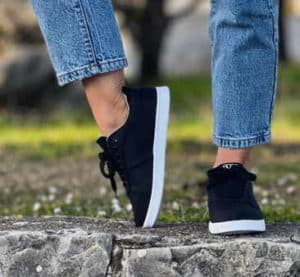
The best vegan waterproof PFC-free sneaker
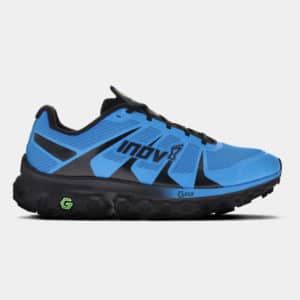
Best sustainable performance sneakers
Why most sneakers aren’t sustainable
As with clothing, fashion trends push people to buy new sneakers more frequently than necessary. The low-quality goods characteristic of fast fashion also means most sneakers wear out quickly. What’s more, sneakers are typically difficult or impossible to repair, reuse, or recycle, which means they end up in landfills.
Companies making more sustainable sneakers not only look at the materials going into the footwear, but they also account for durability and disposal, as well as associated carbon emissions throughout the sneakers’ lifecycle. In truth, even if the entire sneaker industry switched overnight from synthetic materials to cotton, rubber, and leather, there would still be a huge environmental footprint.
The most sustainable approach would be to use natural materials such as organic cotton, rubber, hemp, and cork, as well as recycled polyester and rubber to make a smaller number of more durable sneakers. Ideally, these sneakers would be designed to allow for easier repairs and easier recycling at end of life. That way, a circular sneaker economy could help reduce virgin resource use and overall energy inputs dramatically.
Leather sneakers aren’t eco-friendly either
Leather may seem like a natural material, but to prevent it from rotting, manufacturers treat animal skins with a slew of toxic chemicals. These chemicals pose risks to workers and communities close to manufacturing sites and often pollute waterways. They also mean that the leather isn’t biodegradable and instead sits in landfills leaching pollutants.
Some leather manufacturers market their leather as more sustainable because it is chrome-free or vegetable-tanned. These are sometimes an improvement on standard practices but they’re still not sustainable or healthy.
Good alternatives to leather include plant leathers made from materials that would otherwise go to waste, such as pineapple leaves, apple scraps, and even kombucha SCOBYs. Even these typically contain some synthetic polyurethane, however, or are treated with hazardous waterproofing chemicals. It’s always best to check a company’s approach to leather and alternatives before buying.
All that said, animal leather still has the downsides of being a product of cruelty and exploitation. It’s also responsible for high amounts of carbon emissions.
How do I know? In part thanks to Veja, one of my recommended sneaker buys.
Veja offers incredibly granular information on the carbon emissions associated with each of its shoe styles. By Veja’s calculations, this amounts to 21,5 kg CO2e for one Esplar full leather style, 16,60 kg CO2e for one V-10 B-Mesh style (100% recycled plastic bottles and leather), and 5,63 kg CO2e for one Nova full organic cotton style. Incredibly, 97% of Veja’s production material-related emissions were due to leather, which is a big part of why the company is trying to move away from animal leather entirely.
Conventional cotton
Cotton might seem like a good material for sustainable sneakers, but the reality is that conventional cotton requires massive amounts of water, pesticides, and other inputs for growth and processing. Cotton has a big carbon footprint and is also linked to indentured or forced labor in some places.
The clear alternative to conventional cotton is organic cotton. This requires much less water, far fewer pesticides, and chemical inputs, and has much lower carbon emissions overall.
Even better, manufacturers could favor hemp, jute, flax, and other fibers for the uppers of sneakers. It used to be difficult to legally grow hemp in the US, due to outdated thinking around marijuana and hemp as a plant. Since the law changed in 2018, more farmers are turning to hemp as a fast-growing, environmentally friendly crop that helps remediate soil.
The best sustainable sneaker brands
Thankfully, several sneaker brands are making great products with the planet and worker safety top of mind. So, when it comes to sustainability and sneakers, just do it. And by ‘it,’ I mean make your next pair of sneakers sustainable and ethical by choosing from the brands below.

Ethletic
Highlights: Award-winning vegan sneakers, made with certified Fair Trade organic cotton and FSC certified natural rubber by an industry-leading company that puts the rest to shame.
Ethletic makes PETA certified vegan sneakers using sustainable materials and Fair Trade practices. It avoids air freight and instead ships sneakers for a lower carbon footprint. The company made its first sneaker in 2004 using Fair Trade organic cotton and in 2016 won the Fair Trade Manufacturing Award.
Ethletic uses exclusively Fair Trade certified organic cotton, from farm to mill to dyeing to printing. Its natural rubber comes from FSC®-certified plantations. Ethletic combines the rubber with silica, sulfur and pigments and then vulcanizes it to create elastic rubber soles. Ethletic doesn’t use standard synthetic adhesives to join the sole and upper. Instead, it uses latex milk that has also been vulcanized.
I’m especially smitten with the Hiro sneaker, which made from canvas twill organic cotton from small farmers. This sneaker is completely padded with natural latex foam and has additional support in the heel area. For durability and breathability, the Hiro has an extra sewn sole, three ventilation holes, and a removable sole made of coconut fibers that is absorbent and antibacterial. Get it in bold colors and patterns or more muted monochromes.
About Ethletic
The team behind Ethletic didn’t start out to make shoes. Their journey began with a project to make the world’s first fairly manufactured soccer balls, which they achieved in 1998. This project led to the creation of the world’s first FSC certification for natural rubber and, a few years later, the creation of Ethletic as a footwear company.
Ethletic is the real deal for ethical athletic footwear. For each pair of shoes sold, Ethletic pays a one US dollar premium to the Talon Fair Trade Workers Welfare Society. This worker’s rights association is for the employees of the company’s Pakistani partner factory Talon in the town of Sialkot. The society works in accordance with Fairtrade principles, ensuring the employees also profit from the fair trade practice.
In 2019, Ethletic began offering customers the chance to directly tip the workers who made their sneakers. Facilitated by the social start-up tip me, online customers can send small amounts of money directly to the worker’s cellphone.
More Ethletic Options
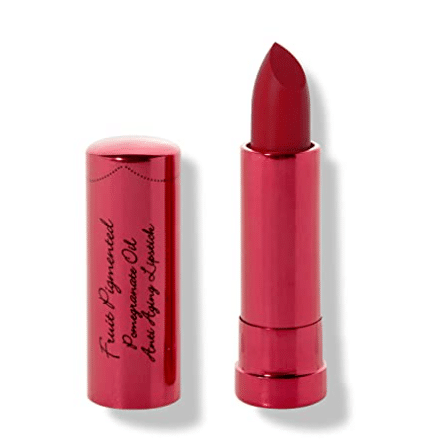
100% Pure Fruit Pigmented® Pomegranate Oil Anti Aging Lipstick
Made in the USA from fruit pigments, all natural, cruelty-free, and vegan-friendly lipstick
View Product
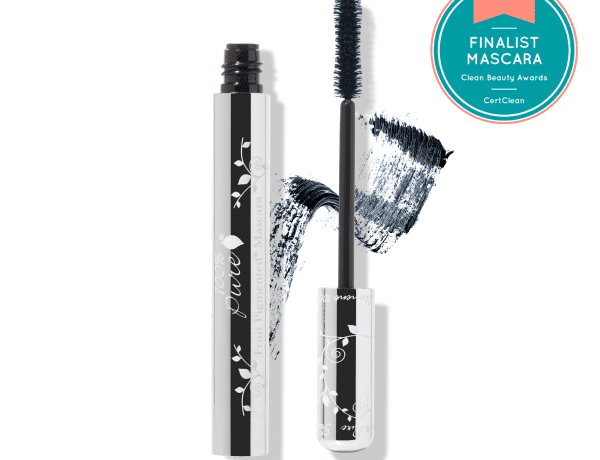
100% Pure Fruit Pigmented® Ultra Lengthening Mascara
Water-resistant and chemical-free mascara made from natural pigments from berries, black tea, and cocoa
View Product
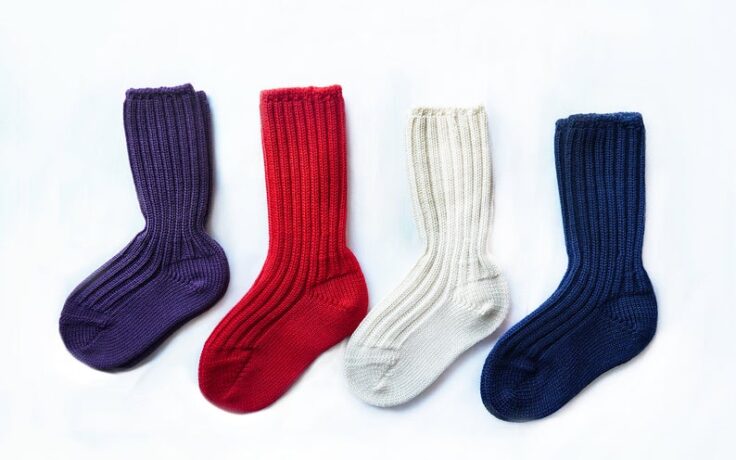
100% ORGANIC WOOL Kid’s Socks
View Product
Also in 2019, Ethletic began to offer a discounted repair option in collaboration with Berlin-based start-up Sneaker Rescue.

Cariuma [Staff Tested]
Highlights: Eco-friendly sneakers made with recycled, organic, and natural materials by a sustainably minded B corp. Comfy, lightweight, machine washable, and with no break-in period. These sneakers are stylish and durable, meaning they’ll last well beyond a season.
Cariuma is a sustainable sneaker brand and Benefit Corporation (B Corp) founded in Brazil and based out of Singapore and the United States. The company’s founders set out to produce stylish sneakers that would remain fashionable for more than just a season and remain comfortable and usable for one year (the incredibly sad industry standard).
Think Converse and similar old-school style but with more modern, sustainable production.
Cariuma has had sustainable product development top of mind since its inception. The company’s approach includes:
- Using natural materials where possible
- (bamboo, cork, rubber, and organic cotton, for instance)
- Using recycled and recyclable materials
- (such as recycled packing paper and recycled PET for labels and tags)
- Moving towards a greater percentage of vegan footwear
- (from 43% of the Cariuma range in 2020 to 65% in 2022)
- Using manufacturing partners that operate ethically
- (WRAP certified factories, Bluesign certified processes, and such)
- Paying far above minimum wage and apply a robust Code of Conduct for suppliers and manufacturers
We tested a pair of Cariuma shoes while on winter vacation in San Diego. Although there are things the brand could do to improve sustainability, the company is ethical and takes care of its workers. The Cariuma cork sole is a game changer. Cariuma is a top pick for style and comfort, as well as sustainability.
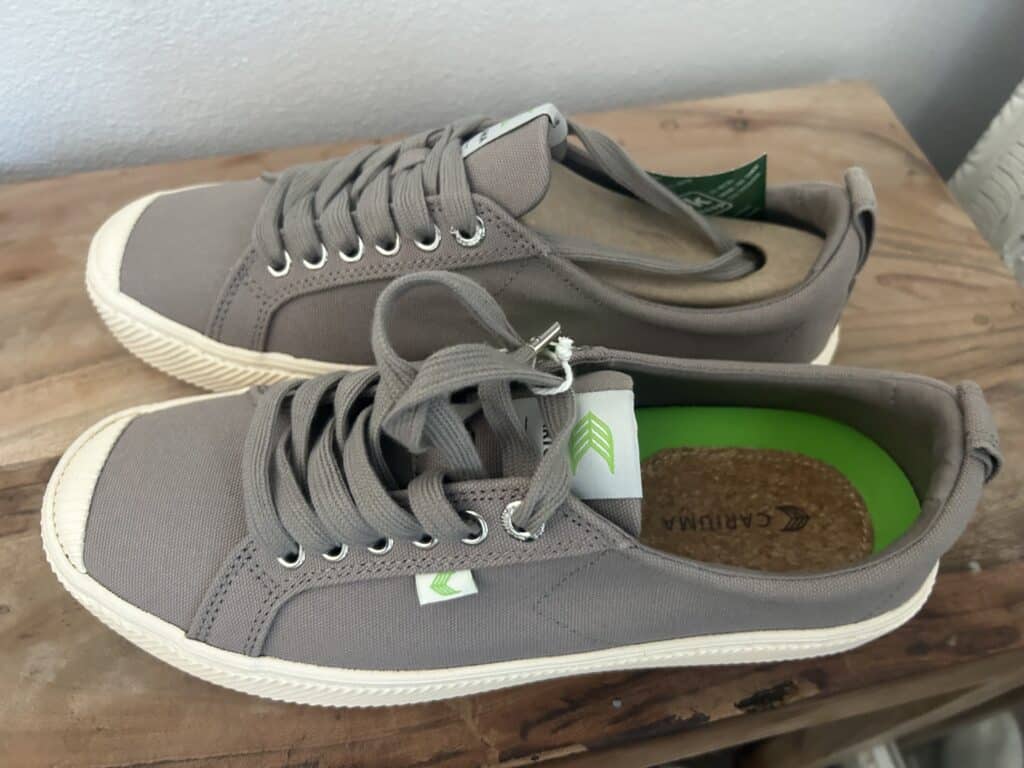

Veja
Highlights: Incredibly transparent B Corp making a wide range of sustainable sneakers using natural, bio-based, and recycled synthetic materials. This company is on a mission to add value and positive change at every step in its supply chain. Definitely one to support, especially because they keep prices low by not advertising!
Looking for eco-friendly kid’s sneakers? Check out Veja, a certified B Corp. As well as making sneakers for adults, Veja offers a range of sneakers for little ones, including a vegan collection. I love the Ollie Canvas Pumpkin Pierre, made with an organic cotton upper, panels, straps, and lining. This design features a water-based screen-printed logo, an insole comprising 19% organic cotton and 55% sugarcane, and an outsole made of 24% Amazonian rubber and 29% rice waste. Altogether, this sneaker uses 46% biomaterials.
Other good eco-friendly Veja sneaker options include the Sea Shepherd men’s sneaker, comprising 50% recycled and bio-based materials. This full-black sneaker features an upper comprising Alveomesh technical fabric (100% recycled polyester). It has TPU and rubber panels, a rubber and rice waste logo, an insole and midsole made with sugar cane and recycled polyester, and an outsole made of Amazonian rubber (30%) & rice waste (5%). The lining, laces, and back loop are all 100% recycled polyester.
Veja uses innovative fabrics from upcycled and recycled fibers. Its B-mesh comprises entirely recycled polyester and is light, breathable, and waterproof without PFCs. B-mesh is made in Brazil from plastic bottles, with 3 bottles going into every pair of Veja on average.
Veja also uses Hexamesh, a fabric comprising 30% recycled plastic bottles and 70% organic cotton in a hexagonal knit pattern. Its J-mesh fabric is a blend of jute, recycled cotton, and recycled PET, with burlap providing anti-static and thermoregulation properties. The company uses flannel made with 100% recycled cotton and recycled polyester.
In 2019, Veja launched a footwear collection using CWL. This vegan ‘leather’ comprises cotton fabric covered by a corn-based coating. It is 63% bio-based and made in Italy (and sounds like Vegea to me).
A third of all Veja shoes are 100% vegan and the company seems inclined to make that percentage even higher. This is partly because a leather shoe involves around four times more CO2 emissions than organic cotton shoes.
All Veja leathers meet REACH standards and are free of chrome VI. All kid lines with leather use ChromeFree leather. The company’s tanning process uses less energy than average and about 40% less water and 80% less salt, and the water is recyclable afterward (rather than being toxic).
About Veja
Veja is a B Corp making sneakers in Brazil. It has been doing so since 2005, but if you hadn’t heard of Veja until now, that’s not surprising. The company deliberately avoids paying for traditional advertising so that it can offset the premium it pays for eco-friendly, fairly sourced materials. By skipping the ads, Veja can sell a superior product at the same cost as a big brand (where ads account for 70% of the cost).
Veja uses fair trade grown organic cotton from Brazil and Peru, as well as sugar cane, rice waste, Amazonian and synthetic rubber, and some synthetic fabrics, including recycled polyester. Every Veja sole comprises 20 to 30% natural rubber, which the company buys at twice the market price direct from cooperatives formed by families of rubber tappers fighting to save the Amazon.
Veja mixes business with social projects, economic justice, and ecological materials. Its aim is to add value and positive change at every step of the production chain.
In 2020, 95% of Veja’s power came from renewable sources, including 100% renewables in its French and US operations. It ships using cardboard shoeboxes matched to the size of the shoe. The boxes comprise 60% recycled cardboard and 40% FSC-certified cardboard. Any plastic used is 80% recycled and the company sea-freights 90-100% of its goods.
The company is incredibly transparent. Veja details its power consumption, supply chain, and processes in a way that would terrify most companies. This demonstrates a real commitment to improving its sustainability. It also avoids talking about what it plans to do and focuses on what it’s actually done, in an effort to avoid the greenwashing that plagues most industries. So, while far from perfect, Veja’s vegan, eco-friendly line gets a big thumbs up from me.

8000 Kicks Seeker Women’s Sneaker [Staff tested]
Highlights: Super comfortable and preppy sneakers for folks of all genders. PFAS/PFC-free waterproof, 100% vegan and made with hemp, recycled and natural rubber, by a sustainably minded company.
LeafScore readers can use code leafscore for 10% off purchases at 8000 kicks.
The Seeker is available for men and women (well, any gender), and is a fantastic waterproof sneaker that’s totally vegan and PFC-free. It is made with a hemp upper treated with a biowax coating that repels water very effectively. The ‘described by 8000 Kicks are the ‘everyday office casual’ model in its collection. This rings true to me, given the ‘everyday office casual’ style is smart and preppy, making these great sneakers for school, the office, the park, and for fun about town.
8000Kicks sends the Seeker plastic-free in sustainable packaging made with recycled cardboard. The company also makes other sneakers using hemp and just launched a vegan-friendly waterproof Chelsea Boot in hemp!
Check out my full review of the Seeker, where I discuss some teething troubles and the company’s excellent response.
I’ve been wearing the Seeker for several weeks and love how comfortable it is, largely thanks to the zero-drop sole. These sneakers are also really light, but they feel robust and durable. They’re tried and tested in some serious downpours and on snow and ice and are very waterproof, excellent at regulating temperature, and have great grip thanks to the sole made of recycled and natural rubber.
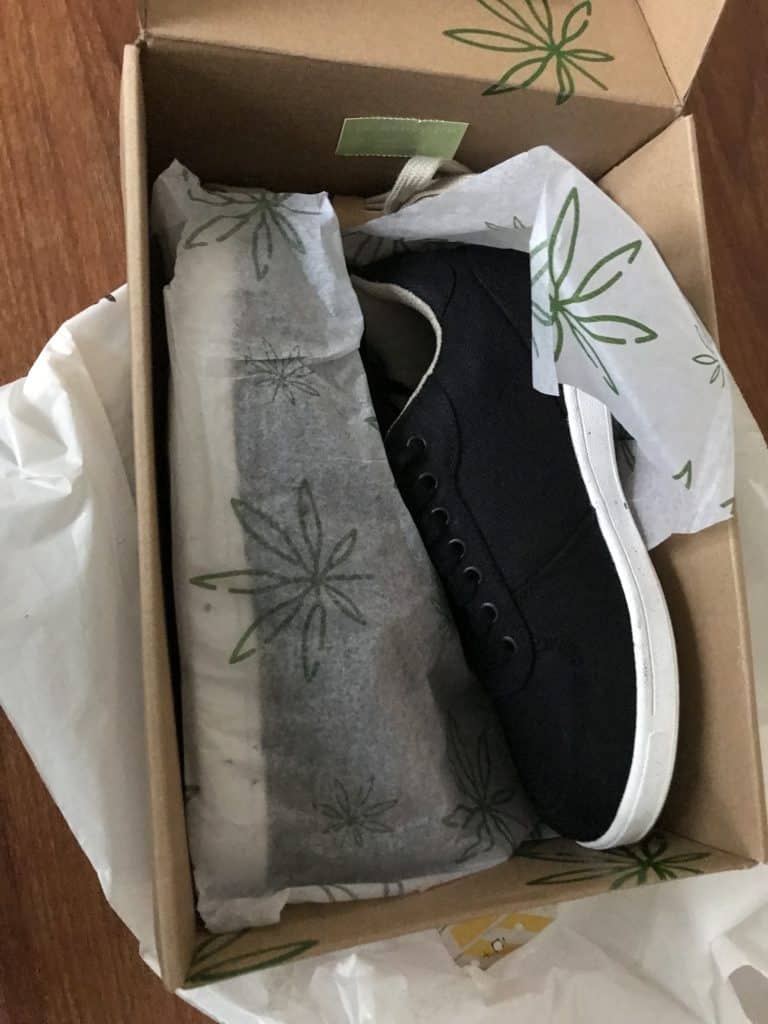
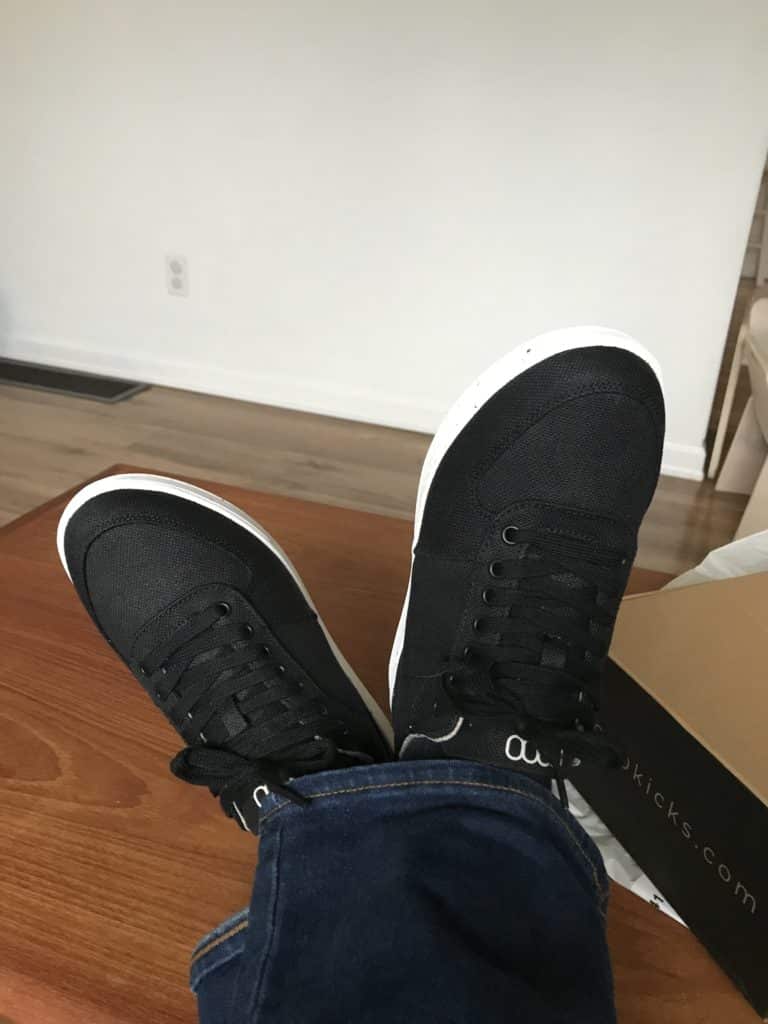
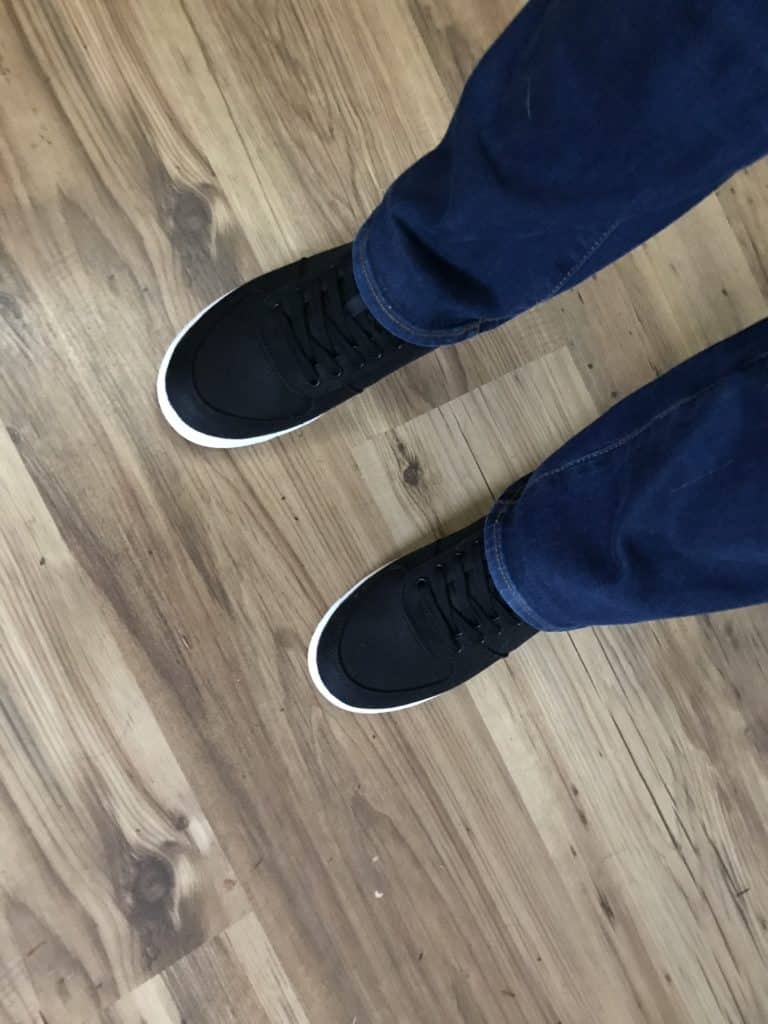
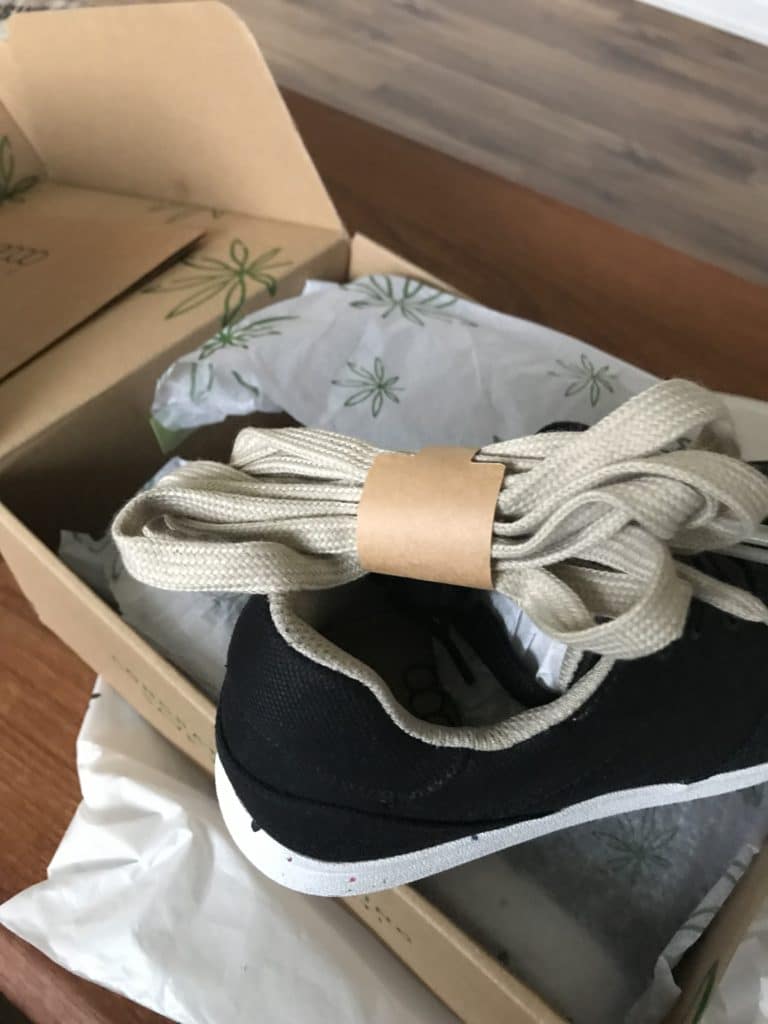

Inov-8 TrailFly
Highlights: Extra-durable sneakers ideal for casual wear to ultra-marathons. Made with Graphene and some recycled materials, totally vegan, and shipped carbon neutral by a company with a robust approach to sustainability.
Inov-8 launched its new, durable, partially recycled, hardwearing Graphene rubber sports footwear line in 2018 to great acclaim. It enhanced its wider sustainability focus in 2020 with a variety of eco-friendly measures and big plans for the future.
The company uses knit uppers and recycled yarns where possible and uses 15% recycled rubber in one collection. All its footwear is vegan and ships carbon neutral.
Inov-8 worked with The National Graphene Institute at The University of Manchester to incorporate Graphene into outsoles and midsoles. The resulting outsoles are 50% harder wearing (50%) and the midsoles 25% more resistant to compressive wear. This means you’re less likely to need to replace your sneakers every few months or even every year.
About Inov-8
Inov-8 intends to offer circular apparel and footwear in 5-8 years, once disassembly and recycling technologies are more widely available. For now, the design team’s focus is on durability and performance, as well as repair and reuse.
Inov-8’s new sustainability strategy also involves producing a smaller number of sample products, using digital samples, and ensuring customers have clear product care instructions to extend the life of products. The company also redistributes shoe samples and returns to underprivileged communities via the charity ReRun.
For shipping, Inov-8 uses recycled card and bottle plastic, and water-based vegetable ink. The Back to Earth Polybags comprises post-consumer waste reconstituted to encourage microbes to quickly (within a few years) break down the plastic in the natural environment, leaving no microplastics or toxic residues. You can reuse these bags to protect your shoes or recycle the bags with other plastic waste. Inov-8 makes its hangtags with FSC certified cards and string instead of plastic.
In the company offices, operations are 90% paper-free and powered by renewable energy. Inov-8 has also reduced global travel and transport-associated emissions by switching meetings online, eliminating print catalogs, and implementing a multi-warehouse system in the UK and the US. The company favors sea freight over air freight.
Inov-8 also donates to tree planting and gives staff time to volunteer with a local food waste charity. It encourages work from home and more eco-friendly transport to the office, installing more bike space, for instance. The office also has a ban on single-use coffee cups and even has a washing-up policy to limit water use!
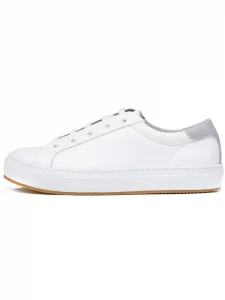
Will’s Vegan Store
Highlights: A carbon-neutral company making sustainable vegan sneakers with mostly natural materials and some recycled materials.
Wills Vegan Store (WVS) makes sustainable sneakers using materials such as recycled rubber, cotton, and Italian vegan leather from plants. This bio-based leather comes from organic cereal crops grown in Northern Europe. The plant leather is carbon neutral, certified OEKO Tex 100, and adheres to REACH regulations. It is breathable and water-resistant, free from phthalates, PFCs, nanotechnology, or APEOs. In fact, all WVS waterproof footwear is certified PFC-free! Some sneakers carry Ecolabel certification.
WVS uses recycled rubber to create cushioning, non-crush-down insoles, and grippy and flexible rubber outsoles. WVS uses compressed cardboard toe puffs and counters and buttons, with Tencel™ and organic cotton mix linings.
The company’s WVSport Recycled Freedom Trainers feature an upper cut from a single piece of recycled (100% recycled polyester) mesh knit. This helps prevent rubbing on seams and allows air to move freely to keep your feet cool during workouts. The sneakers have ERGO-flex™ outsoles for more natural foot movement and an ergonomically positioned flex point that moves with the ball of your foot. The Freedom has a high traction tread for grip and offers excellent cushioning and support courtesy of “deep squishy recycled insoles (100% recycled polyurethane)”.
All WVSport models have ballistic welded construction, so the uppers stay attached to the outsoles, even with regular heavy use. These sneakers are lab tested for abrasion resistance, durability, and water resistance.
Note, though, that the latest WVS vegan leather “contains 69% bio-oil and a viscose (a natural material from eucalyptus trees) backing fabric”. The remaining 31% of the leather comprises polyurethane. As such, the leather is not biodegradable. Avoid any suede sneakers as the vegan suede is made from 100% polyurethane.
About WVS
WVS uses polyester and cotton upcycled from pre-dyed factory offcuts. This helps to keep materials out of landfills and saves virgin resource use. The company sources materials from within the EU as much as possible and now has a warehouse in the Netherlands to significantly reduce shipping distances to European customers and further minimize its carbon footprint.
WVS operates a plastic-free, carbon-neutral supply chain using sustainable materials. WVS has been using entirely plastic-free packaging since 2016 when it also became certified carbon neutral for everything it makes and does. This includes certified Carbon Neutral deliveries, returns, and exchanges, free shipping and returns in the US, and exchanges for 365 days on all orders, using a paperless carbon-neutral returns service.
Your sneakers will arrive in sustainable non-treated paper and cardboard packaging that is plastic-free and carbon neutral. WVS even offers a ‘return to recycle service’ when your sneakers bite the dust.
WVS uses smart CAD technology that mirrors walking patterns to minimize waste and maximize comfort. It has strong ethics around workers’ rights with anti-discrimination and agency worker protection and its own Charter of Human Responsibilities (or Code of Ethics). The company works exclusively with factories in the European Union, which are subject to robust health and safety laws and employment regulations.
WVSport footwear comes from a factory powered 70% by solar (thanks to the array on the roof).
WVS isn’t a newcomer to the LeafScore site! You can find their products in our roundups of the best vegan leather boots, and the most eco-friendly waterproof winter boots for women.
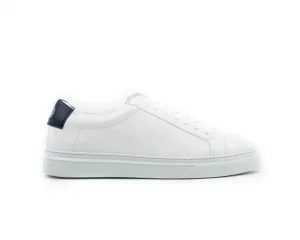
Po-Zu
Highlights: Vegan-friendly sneakers made with VEGEA plant leather, recycled polyester and bio-based linings, natural latex cushioning, cork, and GOTS organic cotton laces!
Po-Zu has three men’s and four women’s sneakers in its current line-up. These low-cut, 7-eyelet sneakers are all made with VEGEA, a leather-like vegan covered fabric that is solvent-free, 100% vegan, and complies with REACH standards for toxic chemicals.
The upper is lined with material made from corn and polyester and is handstitched to the recycled outsole for comfort and stability. The sneakers feature a removable, comfortable, all-natural 100% cork foot-bed insole) and GOTS certified organic cotton laces. There’s also a padded collar and tongue, with natural latex for extra support and comfort.
About Po-Zu
Po-Zu predominantly uses natural materials including GOTS certified organic cotton and Fair Rubber. It also uses linen in some footwear, and has helped push the use of Pinatex, VEGEA, Frumat apple skin, and other plant-based leathers in the shoe industry. Po-Zu is also looking to use mushroom leather in future collections.
Its natural materials come from renewable, responsibly harvested sources, with no pesticides, bleaches, or toxic dyes. The company tries to source materials local to its factories in Sri Lanka and Portugal. Though Po-Zu doesn’t use much animal leather anymore, it aims to source only chromium-free leather.
Po-Zu makes its shoes in Portugal and Sri Lanka in factories committed to ethical manufacturing and a strict non-toxic policy. These factories recycle nearly all their waste products, including fabric off-cuts and water. The company has a strict Solvent Free Policy and will not use any solvent-based substances or glues. This is largely because these chemicals pose health risks to factory workers.
The company designs most of its shoes with circularity in mind, so these can be easily disassembled easily and turned into something new. Most Po-Zu footwear is stitched rather than glued. However, it does use natural latex as a temporary bond pre-stitching of the upper to the sole. Some shoes are assembled using water-based glues.
The company’s name stems from a Japanese word meaning ‘to pause.’ This reflective nature feeds into Po-Zu’s work and its intention to stop the damage to people and the planet caused by footwear manufacture. Reflecting this, Po-Zu has been ranked the no. 1 shoe brand by The Good Shopping Guide for 15 consecutive years.
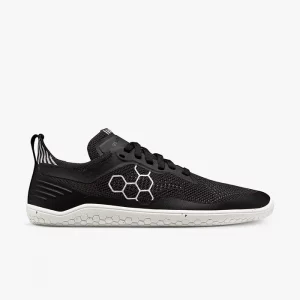
Vivobarefoot Vegan Collection
Highlights: B Corp making a wide range of minimalist, barefoot, shoes – the vegan collection comprises recycled, natural, and bio-based materials with a lighter environmental footprint. There’s also a reconditioned, repair, and resale option – ReVivo!
Vivobarefoot became a B Corp in 2020 and makes minimalist shoes using sustainably sourced materials. These include natural materials (wool, leather, hemp), recycled materials, and biomaterials (“From nature, plus science,” as the company puts it).
My recommendation is for the vegan range only. This collection comprises algae-based bio-foam, natural rubber, corn-based textiles, recycled plastic PET mesh, and other more sustainable materials.
The durable and lightweight Primus Lite sneaker is made partly of recycled plastic bottles, while renewable plant-based materials make up a portion of the high-performance Primus Lite II Bio. You’ll find the algae-based foam in the Ultra III Bloom, highly breathable PET recycled mesh in the Primus Trail Swimrun, and firm ground rubber outsoles in the durable Magna Trail and Primus Trail FG.
Each pair featuring the BLOOM algae-based EVA foam returns 57 gallons of clean water to waterways and takes 40 balloons worth of CO2 out of the atmosphere.
About Vivobarefoot
The company has been around since 2012, and since then it has sponsored numerous worldwide social and environmental initiatives and established the Livebarefoot Foundation, an in-house incubation hub focused on regeneration initiatives.
Vivobarefoot also hosts ReVivo, a repair and resale platform for pre-loved, expertly reconditioned Vivos and unsold stock from previous seasons. Since launching in 2020, the company has repaired 31,000 pairs of Vivos, 19,000 of which have been sold through ReVivo. Vivobarefoot currently offers the repair service only in the UK but plans to expand internationally.
The company’s leather comes from small cattle herds. While Vivobarefoot intends to eliminate the need for chemical additives and to make tanning 100% natural, it makes no claims over its current leathers. This suggests they’re just as toxic as conventional leather, so best to avoid.
The Woolmark wool is better, sustainability-wise. This is merino from Australia, where sheep roam free as part of a regenerative farming approach. Woolmark certification means the farms are audited to ensure adherence to animal welfare standards.
Vivobarefoot makes a big deal of its BLOOM algae-based EVA foam, though only 5% of its foam comes from this natural source. This algae-based foam helps reduce virgin plastic use and removes harmful algae blooms caused by chemical run-offs and exacerbated by climate change. The company intends to make all its foam use bio-based and fully circular for reuse or compostable.
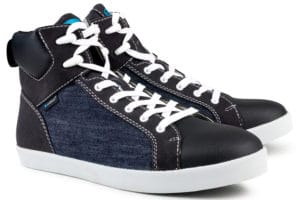
Eco Vegan Shoes
Highlights: Totally vegan sneakers made with Bluesign approved materials, mostly synthetic and not recycled, but long-lasting and normally free of fluorocarbons (check individual product listings).
Eco Vegan Shoes makes sneakers with a variety of manmade and natural materials. Most of these come from Schoeller and are BlueSign® approved, meaning that the whole production chain is considered safer and more environmentally friendly than conventional manufacturing.
These shoes typically feature Eco-OrthoLite® insoles that comprise part recycled polyurethane and part virgin polyurethane from castor beans (rather than petroleum). The company also creates waterproof, breathable uppers using ecorepel®, which is free of fluorocarbons and is washable and 80-100% biodegradable. In general, though, uppers are made with synthetic materials.
About Eco Vegan Shoes
Eco Vegan Shoes has been around for a long time but doesn’t seem to have any serious sustainability initiatives. Instead, its focus is on making vegan shoes that are a dash more eco-friendly than standard.
Extending the life of your sneakers
Proper care can extend the life of every pair of sneakers. This means treating your sneakers as an investment and not as something disposable.
For almost all sneakers, it’s best to remove the insole or footbed, then hand wash or rinse the shoes in cold water inside and out. Don’t machine wash and don’t leave shoes to dry on a radiator or heater. Instead, stuff the washed sneakers with newspaper and leave them to dry naturally, then reinsert the insole.
For minor scuffs and stains, spot clean with a rag and cold water, then leave to dry. And consider darning any minor holes that appear, rather than leaving these to grow until the upper detaches and/or the sneaker is unusable.
If the sneaker’s upper has started detaching from the sole, see if a local repair person can reglue or restitch to extend its life. Similarly, if a sneaker’s waterproofing has started to fail, consider waxing the sneaker or, if you’re game, use the age-old strategy of insulating and waterproofing your feet with plastic bags inside the sneaker. Seriously, this is how I’ve carried on using my hiking boots, even for winter snowshoeing, for the last five years despite them losing all waterproofing.
Final thoughts on sneaker sustainability
Most companies make their sneakers in China, India, Indonesia, and Vietnam, where most electricity comes from burning coal. To make sneaker manufacturing more eco-friendly, then, it takes more than just switching out materials. Companies need to look at where and how they’re making the sneakers.
Ideally, manufacturers would switch to renewable energy sources and implement efficient, zero-waste processes that reduce energy use overall. It also makes sustainability sense to bring manufacturing closer to where materials are grown or reclaimed and closer to the final marketplace. That way, raw materials, and final products are being air freighted or shipped thousands of miles back and forth across the planet.
Finally, a truly sustainable sneaker is one that can be repaired easily. Few companies offer a repair service or tips on self-repair of sneakers. And few offer a takeback service where you can return damaged sneakers to be recycled.
I’m hopeful that more companies will get on board with durable, repairable, and recyclable designs soon. And in the meantime, you can always use a TerraCycle shoebox (view here) to ensure your old sneakers don’t end up in landfills and instead have a chance to become a fresh pair of sneakers or something else entirely.